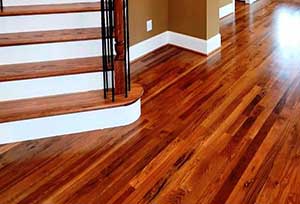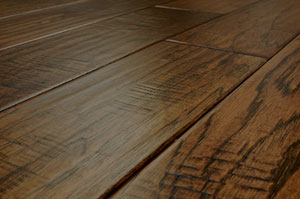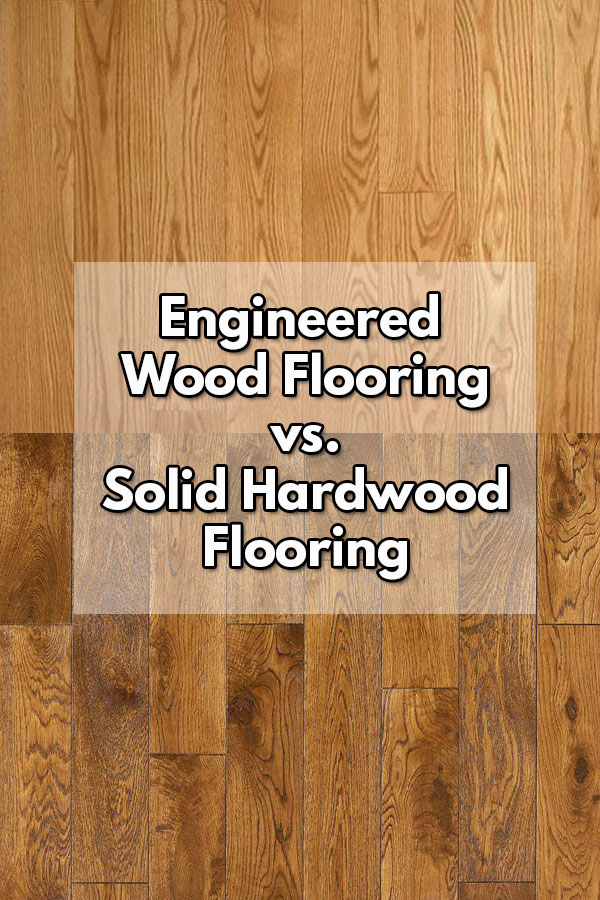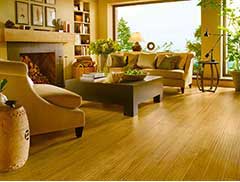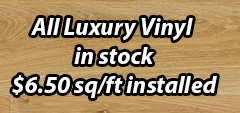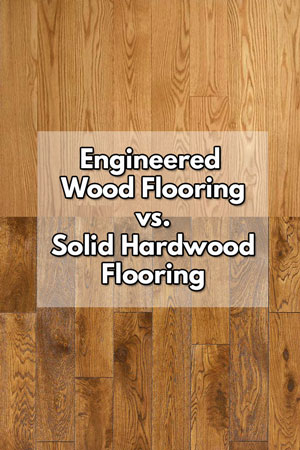 When considering wood floors you may be wondering what is engineered wood flooring and how it compares to solid hardwood. Engineered hardwood flooring is made with a top layer of solid hardwood adhered to layered plywood. When installed it looks the same as solid hardwood.
When considering wood floors you may be wondering what is engineered wood flooring and how it compares to solid hardwood. Engineered hardwood flooring is made with a top layer of solid hardwood adhered to layered plywood. When installed it looks the same as solid hardwood.
Engineered Wood On Concrete Floors
So what is the advantage of engineered wood flooring compared to solid hardwood ? The main advantage is greater resistance to humidity and ease of installation. Engineered wood was developed as a type of wood flooring which could be easily installed over concrete slabs. Solid wood flooring needs to be nailed down on a plywood subfloor. Engineered hardwood flooring comes with the solid hardwood already adhered onto a plywood base. So it can be laid down over concrete without any subfloor. And install options like click lock planks make it quite easy to install yourself.
Engineered Wood Humidity Resistance
It is also better than solid hardwood for areas with high humidity and in basements where the concrete is below grade (ground level). Due to ground moisture in the concrete hardwood isn’t recommended. Suitable options for below ground basements are engineered wood, vinyl, tile or laminate.
Solid hardwood is ideally installed in areas where moisture is not a factor. Should you decide to install solid hardwood in a bathroom or kitchen it’s best to have it finished on site. Prefinished wood flooring has seams, so it will not have the same layer of protection which prevents spills from penetrating between planks. On site finishing seals all the seams – the spaces between planks. Even with a site finished floor you should never wet mop or allow spills to sit on the floor.
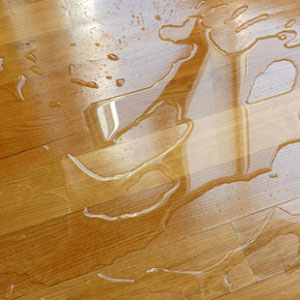 Though engineered wood flooring is more moisture resistant than solid hardwood, the same applies. It still needs to be protected from standing liquid. Most engineered wood floors are prefinished, so the crevices are not sealed like an on site finished hardwood floor. Just keep this in mind if installing engineered flooring in kitchens or bathrooms. Spills should be wiped up right away.
Though engineered wood flooring is more moisture resistant than solid hardwood, the same applies. It still needs to be protected from standing liquid. Most engineered wood floors are prefinished, so the crevices are not sealed like an on site finished hardwood floor. Just keep this in mind if installing engineered flooring in kitchens or bathrooms. Spills should be wiped up right away.
The moisture resistance of engineered wood flooring is more about it’s dimensional stability. Solid hardwood expands & contracts with changes in humidity. Over time this can cause floor boards to warp or gaps to form between boards. Engineered wood has a higher resistance to humidity. It holds up much better than hardwood in high humidity environments and on below grade basement concrete floors. This is due to the way it’s manufactured with wood layers bonded together with adhesive under high pressure.
Engineered Wood Installation Options
The other advantage of engineered wood flooring is the option to install a floating floor with click lock planks. This makes it easy to install it yourself without glue or any special tools. The planks are laid down over a cushioned sound & moisture barrier layer which can be placed directly on concrete or over an old floor.
Engineered wood planks can also be installed with glue, nails or staples like solid hardwood, though these methods are best done by a professional. A nailed or stapled floor is the preferred professional method. It is more solid & permanent than a floating floor. Any unevenness in the subfloor is less of a problem. If a floating floor is installed on a subfloor that isn’t perfectly level the floor may move some when walked on. It will not feel as solid as a hardwood floor which is nailed down. It will be more soundproof though.
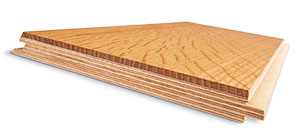 Most Engineered Wood Not As Long Lasting
Most Engineered Wood Not As Long Lasting
The main disadvantage of engineered flooring is it’s longevity. It generally doesn’t last as long as solid hardwood. How long it lasts will depend on the type of hardwood used on the top layer, how hard it is and how thick it is. Most engineered wood does use the harder varieties of hardwood like red oak or brazilian cherry. The harder the wood the more long lasting. But the cheapest engineered flooring usually has a very thin hardwood layer, like less than 1mm. It cannot be sanded & refinished, it’s too thin. Over 2mm it can be refinished 1-2x for each additional 1mm. So higher end engineered wood can be refinished several times. The highest quality engineered flooring can be sanded & refinished about as many times as solid hardwood, so it could last as long, even 100 years or more. Unless though it’s very high quality engineered wood it will not outlast solid hardwood. And engineered flooring is also more difficult to repair or replace. With solid hardwood a damaged section of flooring can be more easily replaced & refinished to match.
Engineered Wood Pricing
Price may be the main deciding factor in choosing engineered wood over solid hardwood. That’s not to say that it’s always less expensive, it can sometimes be more expensive depending on the situation. Sometimes the material can be less expensive but the installation cost more, or vice versa. You’ll have to get professional price quotes. But if you are planning on installing it yourself, that’s where you can definitely save by going with engineered hardwood.
Environmental Factors
Lastly, if you’re concerned about environmental factors look for products with green certifications like Sustainable Forest Initiative or Forest Stewardship Council. And you’ll want to check for info & certifications on low VOC emissions like the FloorScore Air Quality Certification Seal. Adhesives used in manufacturing can off gas. This isn’t an issue with any quality product but it could be with some of the cheap engineered wood flooring. This is something that also must be considered with vinyl & laminate flooring which use adhesives as well. With engineered wood products, especially inexpensive stuff, this is something you want to consider along with how thick the top layer is. Of course these concerns aren’t an issue with solid hardwood.
Summary of the Pros & Cons of Engineered Wood Flooring
Finally, let’s recap the pros & cons of engineered wood flooring:
Pros:
- can be used anywhere hardwood is used, but unlike hardwood it can also be used for below ground basements
- has higher resistance to humidity than hardwood making it less susceptible to gaps, warping and creaking
- more soundproof than solid hardwood when installed as a floating floor with sound barrier
- can be easily installed yourself as a floating floor with click lock planks.
- a floating floor can be installed directly over any old (but level) floor material or on concrete without a wood subfloor
Cons:
- most engineered wood flooring can’t be refinished as many times as solid hardwood, some can’t be refinished at all
- alot of engineered flooring is prefinished – prefinished flooring doesn’t seal out spills as well as a site finished floor
- with exception of very high quality products, not as long lasting
- not as easy to repair, replace & match
- not as wide variety species of wood available
- if installing a click lock floating floor: floating floors can move & aren’t as solid as nailed or stapled down floors
- off gasing from glues used in manufacturing can be an in issue in lower quality products
Get FREE samples of engineered hardwood planks from BuildDirect.
